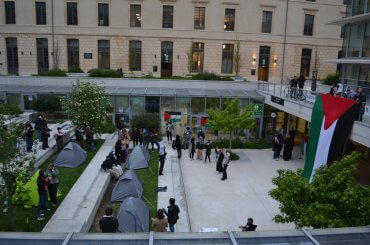The Prime Minister of the Palestinian Authority (PA), Dr. Mohammed Shtayyeh, resigned last week and dissolved his government, citing “challenges” that lie ahead as “an emerging reality” takes hold in the Gaza Strip.
Shtayyeh, the premier for the Ramallah-based PA, has been in his office since 2019 upon his appointment by Palestinian President Mahmoud Abbas, who, now 88 years old, has been in office since 2005 and held onto power ever since.
“The next stage and its challenges require new governmental and political arrangements that take into account the new reality in the Gaza Strip,” Shtayyeh said at a Cabinet meeting on Monday, January 26.
“The decision to resign came in light of the unprecedented escalation in the West Bank and Jerusalem and the war, genocide, and starvation in the Gaza Strip,” Shtayyeh said.
“The next stage and its challenges require new governmental and political arrangements that take into account the emerging reality in the Gaza Strip, the national unity talks, and the urgent need for an inter-Palestinian consensus on a national basis, broad participation, unity of ranks, and the extension of the Palestinian Authority’s sovereignty over the entire land of Palestine,” Shtayyeh said.
Shtayyeh’s resignation and remarks prompted a slew of media attention, with analysts pointing to his step-down as a result of growing pressure from the U.S. on Abbas to reshuffle the PA in preparation for a “day-after” scenario in Gaza. In this scenario, the PA would take over local governance in the Gaza Strip from Hamas, the current ruling authority in the Strip.
Despite supposed plans that the Biden Administration has for the PA, which currently maintains nominal governance over Palestinians living in the Israeli-occupied West Bank, Israel has made it clear that it rejects any scenario in which Palestinians, including the PA, would see an increase in their control after Israel’s war on Gaza ends.
Still, the Biden administration praised the move, with State Department spokesman Matthew Miller telling reporters: “Ultimately, the leadership of the Palestinian Authority is a question for the Palestinians themselves to decide. But we do welcome steps for the PA to reform and revitalize itself.”
As the Biden administration welcomed Shtayyeh’s resignation as a step towards revitalization, Palestinians living under PA control in the West Bank were left scratching their heads. According to analysts, Shtayyeh’s resignation is a far cry from any sort of internal overhaul or serious efforts to combat corruption within the wildly unpopular PA.
If anything, it was a superficial change that most Palestinains saw right through.
‘Whenever there’s trouble, the Prime Minister is the fall guy’
“People were surprised, and didn’t really know how to react. But we do know that the [prime] ministers and the government don’t have any real say in things. That power lies in the presidency,” Fathi Nimer, Palestine policy fellow at the Palestinian think tank Al-Shabaka, told Mondoweiss.
Pointing to efforts over the past decade by president Mahmoud Abbas to consolidate power in the executive branch and in the hands of his close inner circle, Nimer called Shtayyeh’s resignation “more of a cosmetic shake up.”
“The way the PA is structured, it’s inherently flawed by design. It’s not a real state institution, it’s barely autonomous, and it’s made to handle daily life without any real power over borders, resources, or sovereignty,” Nimer said. “I don’t think realistically that this will change the ways of the PA right now.”
Though the timing of Shtayyeh’s resignation came as a surprise to many Palestinians, it wasn’t surprising that, under U.S. pressure for “reforms,” the Prime Minister became the fall guy.
“We’ve seen it happen multiple times before,” Nimer said, pointing to the resignation of former PM Rami Hamdallah in 2019, and his predecessor, former PM Salam Fayyad, who resigned in 2013.
“We have a history of that. Whenever there’s trouble the Prime Minister and his government are the fall guys. When there is pressure on the PA to reform itself, it shuffles things around and turns technocratic,” Nimer said, adding that the potential replacement for Shtayyeh who is being floated around in the media, former World Bank official and chairman of the Palestine Investment Fund (PIF), Mohammad Mustafa, will likely be no different.
“At the end of the day, these are not ‘unbiased’ replacements, because this is the PA. The technocrats that the PA puts in place are always sympathetic to certain people,” Nimer said. “Shtayyeh was chosen because he is a ‘Yes man.’ In general, the prime ministers are Yes men who are just there to carry out the orders of the presidency. They could put anyone there and it would be more of the same.”
“He [Mustafa] is going to be aligned in some way with the presidency, or is going to quit at some point. The face of the person in this position won’t make a huge difference because the power lies in the presidency,” Nimer added.
Any true change will have to come from free and fair elections, Nimer emphasized, not just for the presidency, but for the legislature as well, which has been rendered defunct since Hamas won a majority of the seats in 2007. Abbas and his inner circle have staved off elections for 17 years, with attempts in recent years to hold elections repeatedly postponed by executive order.
It is increasingly regarded as a matter of fact that if free and fair elections were held, Abbas would likely lose the presidential elections, and his party, Fatah, would likely not see a legislative victory either. While Abbas has grown increasingly unpopular in recent years, wartime polls taken in December last year show that discontentment is only growing.
But the disillusionment with Abbas and his government has grown beyond frustration with the president. According to recent polls, close to 60% of Palestinians believe the PA itself should be dissolved.
“Palestinians overwhelmingly believe the PA is a corrupt institution,” Nimer said. “For a while people were split on whether the PA was a blessing or a curse for the cause. But for a few years now I think it’s been a consistent and strong view that it [the PA] is a curse.”
In Nimer’s view, the political corruption that exists within the PA, which takes shape in the form of bribery, nepotism, etc., is trumped by what the Palestinian public view as a much more wicked form of corruption: the PA’s relationship with Israel.
“The PA cannot exist without Israeli approval. The government is pursuing undemocratic policies that are wildly unpopular,” he said, noting the policy of security coordination with Israel, and major concessions made by the PA over the years, including reducing almost all Palestinian control over East Jerusalem, and the right of return for Palestinian refugees.
If Shtayyeh’s resignation is any indication, it seems that the PA is serious about making the surface-level changes needed to convince the U.S. — or help the U.S. convince Israel — that it is ready to play a role, or consider playing a role, in postwar Gaza.
But the PA’s massive unpopularity and the fact that it has, throughout Israel’s genocide in Gaza, aligned itself with the even more disdained Biden administration, begs the question: What does the PA want out of a “postwar” scenario in the besieged Gaza Strip?
“The PA has said they don’t want to ride into Gaza on the back of an Israeli tank,” Nimer told Mondoweiss. “But any victory for Hamas in Gaza, symbolically or otherwise, is a threat to the PA and its policies and programs of the past 30 years.”
“If you’re someone who grew up under Oslo, you’ve only seen the entrenchment of the [Israeli] occupation. If people see that there’s another way possible, that Hamas could ‘provide’ for them, then that’s a huge threat [to the PA],” Nimer said. “They want Hamas to fail at any cost.”
One major obstacle for the PA is how any postwar governance will be perceived by the population, Nimer added. While the PA doesn’t seem to have a problem going into Gaza and governing it, “they need good optics and not to be seen as collaborators with Israel, and that is difficult.”
“But at the end of the day, any postwar situation has to be acceptable to Israel, and anything acceptable to Israel will be bad for Palestinians,” Nimer said. “The PA’s limits in terms of governance will be Israel’s table scraps.”
“If restructuring [the PA] is just the same faces and policies in different positions, then it will not work. We can’t go back to the same status quo.”



Keep the dishonest and warmongering Yankees away …as far away as possible. Dishonest brokers are the last thing needed here.
If the people of Gaza haven’t chosen the PA, America has no business putting them there, and if the PA has any integrity, it needs to put its foot down to US demands.
The PA should be dissolved regardless of October 7th, and Abbas should definitely step down.
Abbas threatened several times to resign. He should have done it. If he had, he might, just might, have some credibility.
As it is, he is a roi negre, a local ruler doing the bidding of the colonial power.
Or to put it more bluntly, a Quisling. The Palestinians know it. The Americans do too, but pretend not to, because he is doing their bidding as well.
Seems a case for annexation, as opposed to an independent state